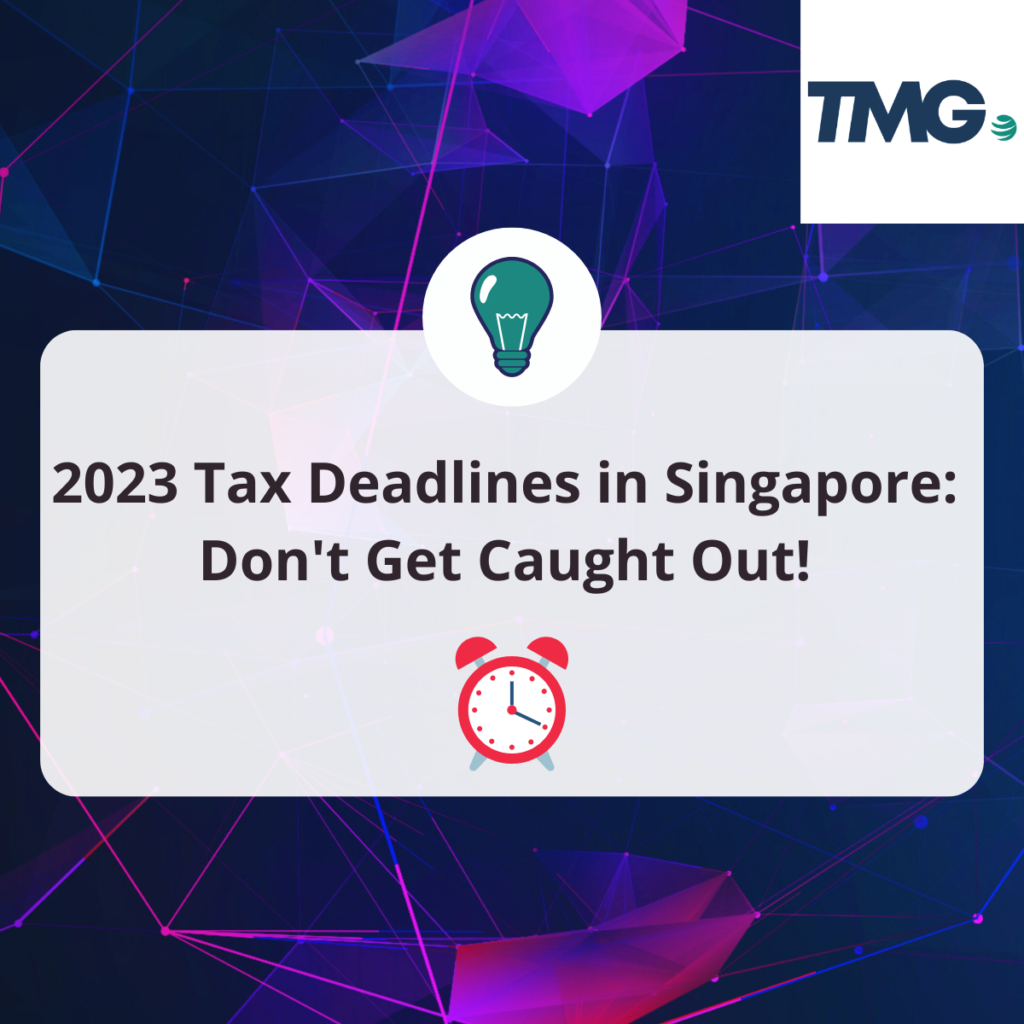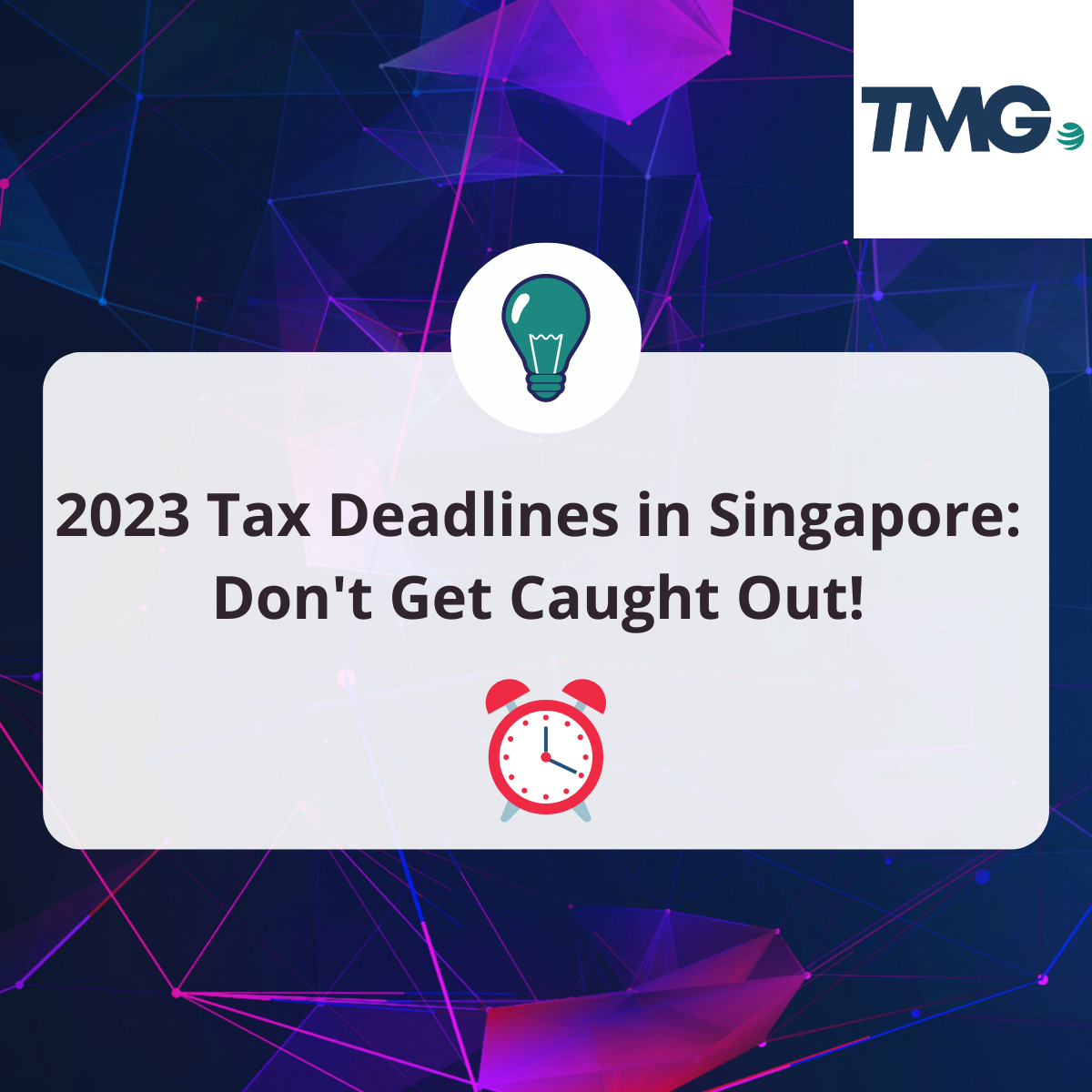If you are a Singaporean individual or a corporate entity having an establishment in Singapore, then you must know when to file your taxes. Tax season is considered very vital for entrepreneurs as paying tax part and parcel of running a successful business. Knowing when to file your taxes is very crucial, particularly if you wish to avoid penalties for non-filing of taxes.

Singapore is considered a tax haven for corporations, so let’s take a look on its taxes and what are its deadlines:
INDIVIDUALS REQUIRED TO FILE TAX
Income Tax Return is required to be submitted if in the preceding calendar year:
- if the total income is greater than $22,000; or
- you have self-employment income with a net profit of more than $6,000; or
- you are a non-resident who derived income from Singapore.
Singapore tax residents have the obligation to pay taxes in Singapore. An individual is said to be resident in Singapore if he lives mostly in Singapore except for temporary absences or has a permanent address in Singapore. Tax residency in Singapore is also decided on the basis number of days you have been employed or stayed in Singapore, so if an individual has been employed or stayed for a minimum period of 183 days in the previous year shall require to pay Singaporean Income tax.
One must keep in mind that, the higher the annual chargeable income, the higher would be the rate of tax a person needs to pay in time.
However, a Singapore resident individual also enjoys certain tax payment exceptions. The Double Taxation Agreement (DTA) article for ‘Dependent Personal Services’ provides the source rules for employment income. For short-duration employment, tax exemption is provided by the source state. The source state is one where the services are provided.
These conditions apply in most DTAs:
- the employment is exercised in the Source State for less than a specified period (typically 183 days in any 12-month period); and
- the employer should not be a resident of the Source State; and
- the disbursement of the income should not be linked to a permanent establishment or fixed base of the employer located within the Source State.
Filing due dates
April 15 is the due date for filing the return of tax based on a calendar year for 2023.
CORPORATES REQUIRED TO FILE TAX
Singapore Corporates need to pay taxes on income earned in Singapore as well as on the remittance of income earned from foreign sources. Corporate taxes are imposed at a flat rate of 17%.
There are certain partial tax exemptions and exemptions to startup companies available. A startup company is eligible for a 75% of tax exemption on the first chargeable revenue of $100,000 and an additional 50% exemption on the next chargeable revenue of $100,000 for a period of three consecutive YA.
From the fourth YA onwards, all new companies and start-ups will qualify for a Partial Tax Exemption (PTE):
- A 75% exemption on the first $10,000 of normal chargeable revenue, and
- An additional 50% exemption on the next $190,000 of normal chargeable revenue.
Corporates are basically required to pay the following types of taxes:
- Estimated Chargeable Income (“ECI”)
- Goods and Services Tax (“GST”) payment
- Corporate Income Tax in Form C, Form C-S/, Form C-S lite
Filing of ECI
ECI (“Estimated Chargeable Income”) is an estimate of company’s taxable income for a particular YA (Year of Assessment). Even if the estimated taxable income in nil, ECI filing is mandatory for companies.
However, there are certain exemptions to ECI filings, if your company meets both of the following criteria:
- The annual revenue of the company for the financial year does not exceed $5 million; and
- ECI is nil for that particular YA. The ECI is the actual value before taking into consideration the startup tax exemption amount or partial tax exemption amount.
The due date for ECI filing is three months from the end of the fiscal year.
Filing of GST Payment
If your company is GST-registered*, you would need to file GST return every quarter. Quarterly GST return shall be filed by last day of the month following that particular quarter. Following are the due dates for GST filing if the GST accounting period are:
- January – March: GST to be filed by 30 April 2023
- April -30 June: GST to be filed by 31 July 2023
- July – September: GST to be filed by31 October 2023
- October – December: GST to be filed 31 January 2024
In case of non-filing of GST return within the due dates, a penalty will be applicable of $200 for every month of non-filing subject to the maximum of $10,000 per unfurnished GST return. The Singapore concerned authority may also send you the estimated NOA along with a penalty of 5% on the tax.
* Mandatory GST Registration Threshold
GST Registration in Singapore for Companies is mandatory if:
- The taxable income for the past 12 months exceeds S$1 million; or
- The company is of the belief that the company’s taxable income will be more that S$1 million in the next 12 months.
Corporate Income Tax – Form C, Form C-S or Form C-S (Lite)
30th November of every year is the due date for filing of corporate income tax return for the preceding financial year. Following are the 3 types of corporate tax return: –
- Form C-S: Companies with annual income of maximum $5,000,000
- Form C-S (Lite): Companies with annual income of not maximum of $200,000
- Form C: All companies that do not fall in the above two criteria
One must consider that a latest financial statement needs to be submitted with Form C, unlike form C-S and form C-S (Lite).
Thus, the last date for filing corporate tax return is 30th November each year for every corporate in Singapore. If the filing is not done within the due date:
- the Singapore authorities (i.e. IRAS) may send out an expected NOA (Notice of Assessment) which shall obligate the receiver corporate to pay the estimated tax within a period of 1 month from the date of NOA.
- IRAS may offer to compounding the offence
- Issue a notice under Section 65B(3) to company’s director calling for the required information to be submitted under Corporate Income Tax Returns
- Issue the Court summon notice to the company or persons responsible for running of the company.
How to Comply? Stay Rest Assured!
You don’t have to do everything by yourself. TMG is the answer to all your woes. You will have a Professional, who will be your advisor, and help you navigate these compliances.
In a nutshell, we will take care of your compliances – so you have more time to focus on your core business at hand.
Click Here To Book a call with us today!

 Toll Free:
Toll Free:  Contact Us
Contact Us


